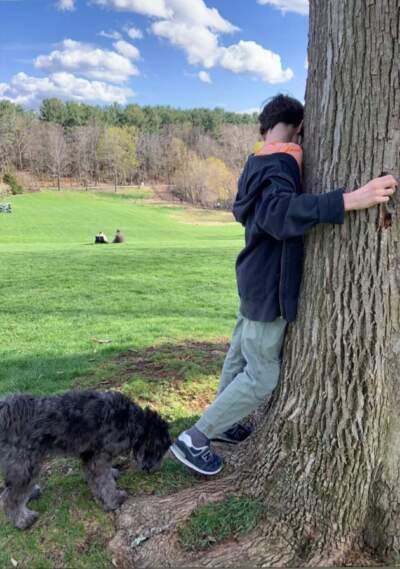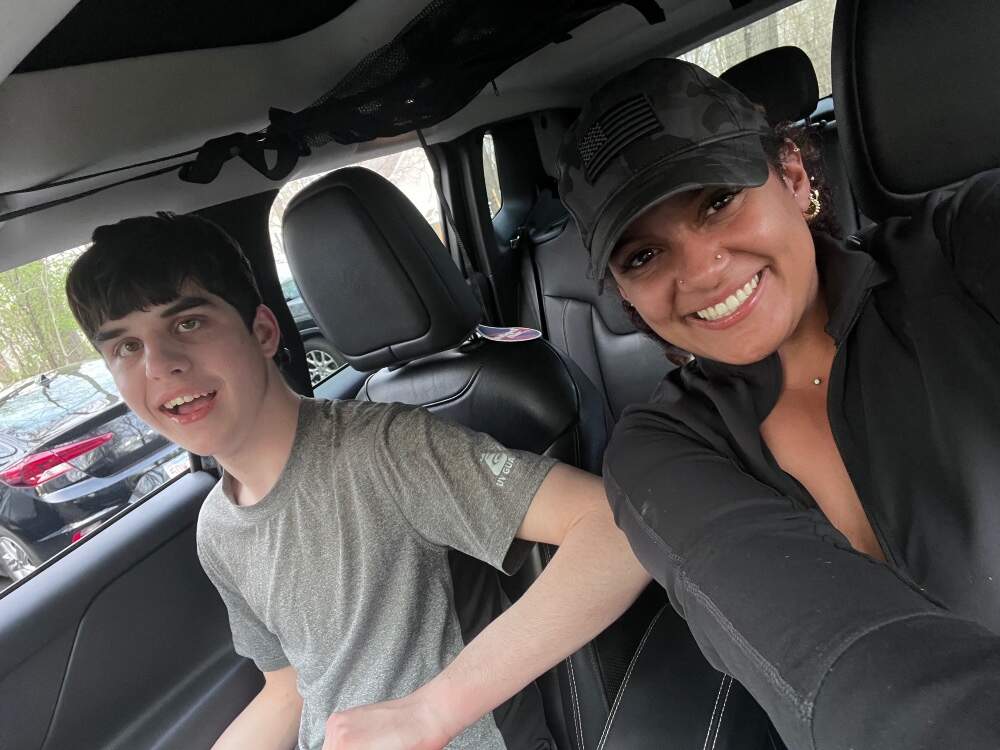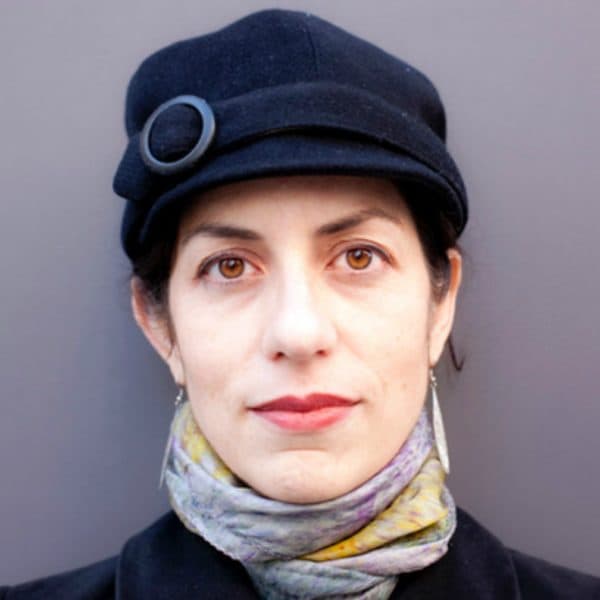Advertisement
Commentary
My son has profound autism. And we are still a family

My son sits at a table at his school folding a bright blue long-sleeved shirt using a folding board. He claps the board from the right, from the left and then from the bottom and ta-da!—the shirt is folded. He’s so used to this action that he completes the task without even looking down, letting his eyes wander across the room to the other students engaged in similar tasks, and then over to me. “Nice job,” I exclaim, almost in unison with his teacher. Finn’s not used to seeing me here, and I was worried my presence would distract him, but he’s doing great.
My child is not a boy in Montessori, but a 17-year-old in a school for autistic children and young adults. We are in his school’s Career Developmental Center, aka the CDC. He’s been coming here every Friday for close to two years. I watch him fold shirts, hang shirts and purchase himself a snack at the school store using his communication board, since he’s non-verbal. Before I leave, I watch him gather backpacks from lockers and deliver each of them to the other seven boys in his class. It’ll soon be time for the van to leave from the New England Center for Children for their residence. Gathering bags isn’t an established job at the CDC, I’m told, just one Finn likes to do and is good at.

Ordinarily I’d be proud of Finn for mastering these tasks, but today I wonder: is this the best he'll ever do? And then I feel ashamed for even having these thoughts. In my head I hear the words of Robert F. Kennedy, Jr., the United States Secretary of Health and Human Services.
In a news conference on April 16, Kennedy discussed new data from the Centers for Disease Control and Prevention that showed autism diagnoses among children continuing to rise in the United States. Though the increase is largely thought to be driven by broadened criteria and increased awareness, Mr. Kennedy falsely declared that autism was preventable and called the situation “an epidemic.” What he then said was so harmful—and just plain false—that a friend texted me out of the blue to say she was thinking of me.
“These are kids who, many of them, were fully functional and regressed because of some environmental exposure into autism when they’re 2 years old," Kennedy said. (Not true.) "Research into genetics is... a dead-end," he continued. (Also false.) “This is an individual tragedy as well. Autism destroys families,” Kennedy said. “These are kids who will never pay taxes. They'll never hold a job. They'll never play baseball. They'll never write a poem. They'll never go out on a date. Many of them will never use a toilet unassisted." Since he made these comments last week, RFK specified that he was talking about the "25% of people who have severe autism," basically singling out kids—and families—like mine.
Our son Finn showed "delayed myelination" as an infant. He was late to hold his head up, late to sit up, late to walk. He was diagnosed with autism before he was two. These delays were evident before his first vaccinations. Finn's sloped eyes and wide nasal bridge indicate the likelihood of his being born with a genetic condition. Furthermore, scientists have known since the 1970s that genetics contribute to the development of neurodevelopmental disorders. And Finn can use a toilet unassisted. He can. He even washes and dries his hands. But the rest?
Advertisement
I used to worry that when people would see me out with my son, who’s handsome but slightly crossed eyed, now tall and strong but with the abilities of a much younger child, they’d feel revulsion or pity. Kennedy’s statements confirmed the validity of that concern.
I wish I could be one of the angry parents—and there are plenty whose opinions can be found online — who say, “My kid does play baseball and one day he will hold a job.” (Though with DOGE now cutting funding to the types of programs that help disabled teens find employment, this may be harder.) There are parents who could argue: “Don’t say what my kid will ‘never’ do, because I believe he can do anything. Take a look in his classroom and you’ll find a different kid than the one you’re describing.”
I wish you could see what I see, not as society sees him, but as the people who care for him see him.
Contrary to what’s suggested when Kennedy called autism “an epidemic,” as though it were contagious, autism is not a disease, it’s a spectrum disorder. Some kids with autism are highly capable and competent. They grow up to attend college, hold prestigious jobs, pursue relationships and even marry. Members of this community can organize and advocate for themselves and many do, forcefully and impressively.
There are also kids who are diagnosed with “profound autism.” Without the right combination of early intervention, supervision, and sometimes medication, such kids can cause harm to themselves and others. My son is in this group. When Finn was a boy he used to bolt out of stores and into the street. Today he suffers pica, eating nonfood items that could wreak havoc on his system. Sometimes he bites and hits himself. I wish we knew why, because then we could stop it. But he, like many who are profoundly autistic, cannot speak. Because this community is frequently left out of the research studies, they are the least studied and understood.
I want to be one of those angry I’ll show you moms. But the truth is I know that my son is the kind of kid Kennedy would point to and say, Here. This is what I’m talking about. These are the kids whose autism destroys families.
While we have faced real challenges, autism has not destroyed our family. It’s not the disorder that has caused us the most harm, but the ways that our experience with autism has left us feeling isolated and misunderstood. You get tired of having to argue for the dignity of a person who doesn’t behave like other people, and for the value of a life that doesn’t follow the normative path. Too often we measure our kids’ success via what society defines as accomplishments: their marks in school, their scores on the sports field, their financial success, their ability to marry and have successful kids. But none of this captures my son’s unique talents, including the devotion he provokes in his family and teachers.

I wish you could see what I see, not as society sees him, but as the people who care for him see him. Not as a failure, or a list of Nevers. But as someone who is mischievous and delightful, who notices more than you think, someone who is capable of great depths of feeling. I want my son to live in a society where someone is valued not through the lens of productivity—work and taxes—but through the way he makes others feel. His former teacher, and best friend, drove up from North Carolina to Boston Easter weekend just to spend time with him. It’s the urgency of my want, the ineffability of this articulation, that overwhelms me.
As for my son never writing a poem? Walking with Finn through the park is a poem. The way he wordlessly threads his arm through mine, the way he's attuned to sounds of the wind in the leaves and the feel of tree bark beneath his fingers. The way his wordless presence calms me. He lives in the moment like no one else.
All parents want our children to prosper and to matter. I’ve reached peace with the idea that my kid may not prosper in the traditional ways. He won’t march across a stage next month to receive his high school diploma. We won’t pack him up for college this fall. But I know, now more than ever, that his life—and other lives like his—do matter.
Sign up for Cog's weekly newsletter, sent on Sundays. We share stories that remind you we're all part of something bigger.
